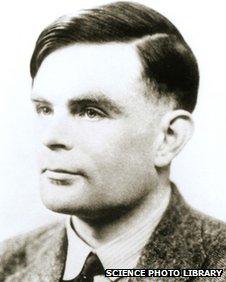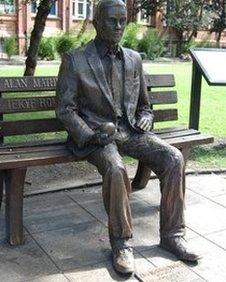Alan Turing: Manchester celebrates pardoned genius
- Published

Manchester's A6010 road was renamed Alan Turing Way in 1994
The decision to pardon wartime codebreaker and computer pioneer Alan Turing has been roundly welcomed, but in Manchester, where the campaign began to clear his name, it has been especially celebrated.
Alan Turing is credited with cracking Nazi Germany's Enigma code, in the process shortening World War Two, and saving countless lives.
He was also a mathematical genius, the father of the modern computer and much of his ground-breaking work was conducted at the University of Manchester.
Today, mathematics students at the university attend lectures in the building bearing his name.
But it was also in Manchester, in 1952, that Dr Turing was arrested for having sex with another man, which was then an illegal act.
He was tried and convicted of gross indecency, banned from working for the government and forced to have injections of female hormones in a bid to render him asexual.
Two years after his conviction Turing poisoned himself with cyanide, which a inquest deemed to be suicide.
The fact that such a "national hero" was then treated by the state in such a "barbaric" way was described as a "terrible blight on our history" by Justice Secretary Chris Grayling, who requested the royal pardon.
The decision has been welcomed by Manchester's gay community, who have strived for years to get Turing's story a wider audience.
"It's great news but something that is long overdue," said Rob Cookson, director of The Lesbian and Gay Foundation (LGF), based in Manchester.
"It is recognition to the range of people involved in fighting this. It is another step towards equality."
Gay 'pride'
The original petition calling for a posthumous pardon was begun by William Jones - also a computer scientist and a gay man living in Manchester - which eventually reached 37,000 signatures.
"It's a very good step along the path that the country's realised what happened to him and the law generally was wrong," Mr Jones said.
"In Manchester he's not as well known as he should be but it's [the pardon] something the gay community should be very proud about."

A statue in Sackville Gardens is one of several local tributes to Alan Turing
Back in 1994, when the city's leaders renamed part of the inner ring road Alan Turing Way, some people living nearby did not recognise the name.
"The council leader at the time was a mathematician and had heard of Turing," said councillor Pat Karney.
"We were horrified when we heard the story, particularly the chemical castration and secondly because of his unrecognised contribution to computers and the war."
'Unfair and appalling'
The renaming of the road - and the subsequent decision to highlight his story by commissioning a play about his life - marked a turning point, Manchester Withington Lib Dem MP John Leech later told Parliament.
"Over time, however, the simple fact of renaming it meant people got to know about him."
Calls for a permanent memorial followed and a statue of Alan Turing sitting on a bench in Manchester's Sackville Gardens, close to the city's Gay Village, was unveiled in 2001.
Sculptor Glyn Hughes said it is now a popular tourist attraction, but when the idea for a prominent memorial was first put forward 13 years ago funding was hard to come by.
"I am absolutely delighted... I think this will be a landmark case," he said.
As Turing's story gained profile, a petition started by computer programmer Dr John Graham-Cumming led to a official apology in 2009 from the then Prime Minister Gordon Brown.
His efforts were backed by Mr Leech, who tabled a motion in Parliament last year calling for a posthumous pardon.
He said: "Alan Turing's contribution to Manchester was enormous as well as his efforts in bringing the war to an early conclusion. He is a national hero."
'Lives destroyed'
The decision to pardon Dr Turing means attention can be focused on his "significant" achievements, which are marked at the University of Manchester where he spent the last six years of his life working.
In that time he helped create the world's first modern computer, the Manchester Mark 1, and also invented a test for artificial intelligence.
Professor Dame Nancy Rothwell, president and vice-chancellor of the university, said: "His legacy will live on as one of the most significant scientists of his or any other generation."
The city council and the LGF last year launched the Alan Turing Memorial Award to recognise people who have made a significant contribution to the fight against homophobia.
And many campaigners are calling for Dr Turing's case to set a precedent enabling further pardons for others who had similar convictions.
Mr Karney said: "Lots of other lives were destroyed. We will be righting their injustice in a symbolic way."
On 31 March - the date he was convicted - the city council will hold an Alan Turing Pardon Day and the names of other Mancunians convicted of the same offences will be read out in a ceremony before the statue of the great man.
- Published24 December 2013
- Published20 June 2012
- Published19 June 2012
- Published7 December 2011